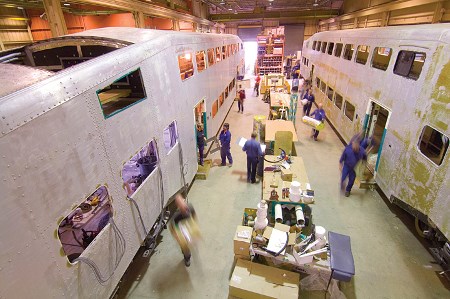It was a "huge learning curve" for Ontario Northland Railway shop crews to get up to speed on how to rebuild GO Transit's bi-level passenger coaches.
But its fleet manager of the Toronto transit authority can't argue with the result.
In making comparisons with other outsourced refurbishment work done by other companies, "this is the best car," said Peter Lloyd, GO's manager of rail equipment.
He wrote a glowing testimonial posted on Ontario Northland's website challenging anyone to notice the difference between a new coach and one refurbished.
The $81 million GO Transit contract was signed in 2004 to refurbish 121 bi-level commuter cars. The contract was structured to give Ontario Northland the first 71 with the option of adding 50 cars if GO Transit was satisfied with the work.
The first car arrived in November 2005 with the 59th delivered back to GO in early February. The contract expires in July 2011.
The refurbishment was basically a full-scale re-build of the 18- to 20-year-old coaches.
The contract has kept 100 employees working in Ontario Northland's Refurbishment Division, a vast 61,000-square-foot rail car shop complex, which added a new paint shop added in 2004.
The project involved the cars being torn down to the frame, re-constructed, and re-painted.
GO Transit has maintenance facilities of its own at its Willowbrook yard in Etobicoke, but only for running repairs such as fueling locomotives, cleaning coaches, inspections and fixing any work.
The Toronto transit authority were the first owners of the sturdy bi-level cars. In previous refurbishment contracts they worked with experienced rebuilders such as Bombardier in Thunder Bay and Canadian Allied Diesel in Lachine, Que.
With Ontario Northland's business faltering earlier this decade, the North Bay shop needed more diversified work.
"Everything was looked at to make the operation more lean, and to operate at capacity" said spokeswoman Tricia Marshall for the provincial Crown agency. "Every division was under scrutiny to be the best we can be."
They successfully landed the GO contract but there were initial bumps in the road.
"Maybe that was going out on a limb a little bit," said Lloyd. "We did suffer at the beginning because there was a large learning curve."
The ONR's service bays were geared to handle their own locomotives and rail cars. The process of rebuilding a coach to a customer's specifications was completely different than a "running shop mentality," said Lloyd. It meant developing new procedures, drawings and establishing a whole new process.
"This really set them back because they weren't set up for this," said Lloyd. "From the get-go it was not smooth. There was a year of really working hard, us and them, is get this program working properly."
At the outset the railway didn't have the re-manufacturing know-how so the whole program was delayed a year before production started rolling.
The delays caused the original schedule to be scrapped and resulted in some liquidated damages being arranged. No cheque was written by ONR, said Lloyd, but some contractual amendments were made to account for the lateness of delivery, with some costs being picked by the Ontario Northland, and a new schedule was drawn up.
"But we worked together as a team, in working with contractors, and not just trying to kill them with liquidated damages and put them out of business. And they were very receptive in listening to our ideas and we moved them into a production line process that enabled them to deliver coaches in the time slot that they had to deliver them."
It was a complicated refurbishment, said Lloyd, but the North Bay shop handled some significant change orders easily.
The coaches were stripped down to the frame with new flooring, carpeting, seat shells, windows, inside walls, lighting fixtures, heating and cooling systems. Even the undercarriage insulation was peeled off and resprayed with new wiring, piping and truck wheels added.
"When that car comes out it's basically a new car," said Lloyd. "In the end, the product is the absolute best."
To takes 18 weeks to rebuild one coach. There are nine stations on the assembly line with a car spending two weeks at each station.
In a very staged assembly line program, the coaches were rotated north one-by-one as cars returned and others were taken out of service.
Marshall said the experience gained from this contract should allow them to bid on potential work with .
With more refurbishment contracts for more bi-level coaches oming up in the next few years, Lloyd said Ontario Northland's work to date definitely established them as a solid operation and puts them as a potentially successful bidder.
www.ontarionorthland.ca
(30)




